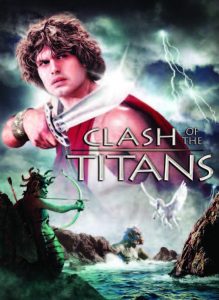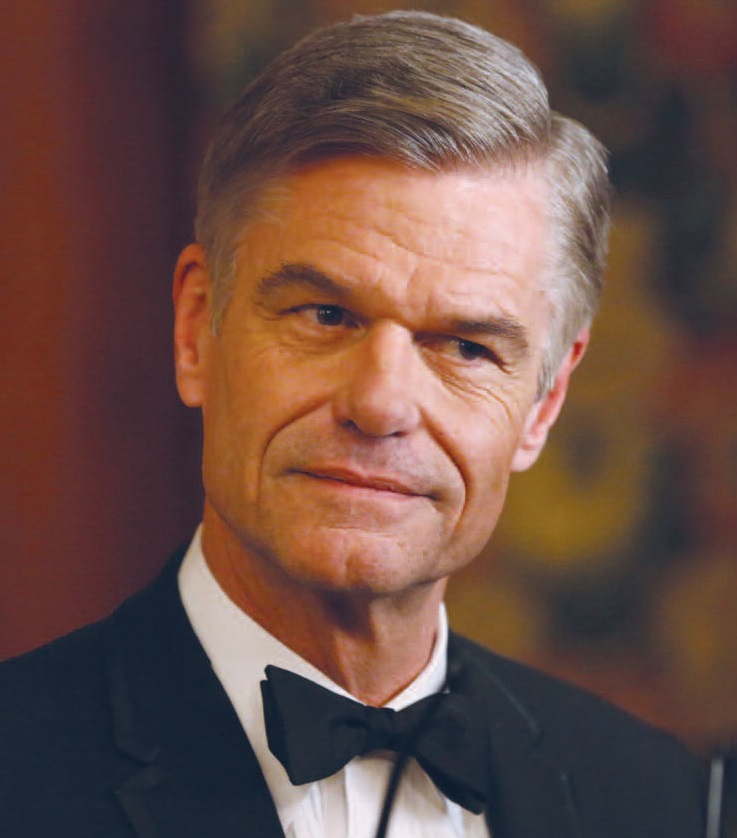When Princeton-educated F. Scott Fitzgerald wrote that there are no second acts in American lives, it is unlikely he imagined someone like Yale-educated Harry Hamlin. Like the figment of a talent agent’s imagination, Hamlin arrived on the entertainment scene in the late 1970s with a killer combination of easy charm, classic good looks, impeccable stage training and a knack for making parts his own. After reaching the apex of his profession in the 1980s, he backed out of the spotlight to raise his family. When Hamlin decided to get back into the game, his timing couldn’t have been better. Yet, as Editor-at-Large Tracey Smith discovered, when it came to landing the role of Jim Cutler in Mad Men, timing wasn’t everything.
EDGE: In 2014–15, you are a cast member of Mad Men and Shameless. They are wildly different shows. Are they wildly different sets?
HH: No. They’re both extremely professional. John Wells and Matt Weiner are two of the most accomplished and professional writer/show-runners that have ever existed. So you can imagine that everything is extremely well thought- out on both sets. There are very few differences, other than the fact that on the Shameless set you’re not allowed to have any sides. Sides are small versions of the script that are handed out every day, kind of a crib sheet for the actors. John Wells doesn’t permit them; he demands that the actors know all of their lines in advance. Normally, the sides are right there in your dressing room and you look at them to find out what scene you’re doing first and what the order of the scenes is, and what words you may need to brush up on. In the car on the way over to the set from the studio, Emmy Rossum said, “You’d better know your lines—if you don’t, you’re in deep trouble with John Wells and he’ll never hire you again!” (laughs) So, it’s a good thing I knew my lines.
EDGE: How did your casting experience compare on the two shows?
HH: For Shameless, I was offered the role and didn’t need to read for it, or even meet John Wells. He obviously knew who I was. Matt Weiner has a policy where he meets everybody that comes on the show, and reads everybody that comes on the show. But he normally doesn’t cast anyone who has a profile. He likes actors to be somewhat known, but not really, really well known. In my case, there have been times in my career when I have been really, really well known, but not so much lately, because I took some time off to raise my kids. Anyway, I was surprised to get the call from my agent to go in and meet Matt and read for a part they called “Swinger Boss” for Mad Men. They told me it would be a one- or two-episode part. I was a fan of Matt’s, and I loved the show, so I agreed to go in.
EDGE: But Matt obviously knew who you were.

Photo by Eiske Photography
HH: Yes. The casting directors told me later that they had to spirit me into the room by putting a fake name on the docket for Matt, because they wanted him to see me for this part—but they knew that if he saw my name on the docket he probably would say, “Wait a minute, what’s he doing here? I don’t see guys who are well known.” So as soon as I walked through the door, there wasn’t much Matt could do but say, “Oh. Hi. How are you? Welcome and let’s read the part.” So I read for the part…and didn’t get it. I was disappointed, because I wanted to work on Mad Men. But a few months later, they called and offered me another part. They didn’t tell me it was Jim Cutler. They said it might go for two episodes, but definitely one. Once again, I said to myself, Well, I don’t really do just one episode, but then [my wife] Lisa said, “Come on! It’s Mad Men! You should go in and do it…maybe you could get Jon Hamm’s autograph!” (laughs) So I did. I went in, got the part, and it expanded and became what it has become now.
EDGE: Cutler seems like a deep pool, a pragmatist who plays everything close to the vest. What do you like about that part?
HH: I like that he’s quirky. It’s a chance to play a character that’s somewhat eccentric or a little bit off. I saw Jim being at somewhat of an angle to reality—not exactly a right angle to reality, but maybe thirty degrees off. In my opinion, he has potentially another secret life that has not been revealed. They gave me a lot of latitude to create the character that I wanted to create. I had to say the words they gave me, but when it came to my behavior, they kind of let me loose.
EDGE: Do we see any Harry Hamlin in Jim Cutler?
HH: No. The rhythm and how he holds his body, I don’t do that at all in life. I actually used my 10th Grade Latin teacher as a kind of a template. I remember him being pretty tightly wound.
EDGE: How would you characterize the quality of the writing on Mad Men?
HH: Every single word is well thought out—the choice of every comma, every single nuance of the language. There’s nothing there by accident, and there’s nothing there that hasn’t been embedded over and over again to make sure that the cadence that the actors deliver is exactly the cadence that they want to hear. Oftentimes, narrative dialogue is very right-on-the-money; it’s not how people actually speak. In Mad Men, they have integrated spontaneity into the dialogue.
EDGE: You mentioned taking time off to raise your children. What was behind that decision?
HH: I deliberately stepped back from the business when my new flock of kids was born. The hours that we keep on TV shows just do not jibe with raising a family, and with films you’re going on location all the time. It was the late 1990s and the business essentially left L.A. right about the same time the kids were born. You’ll recall that the Canadian dollar went way down, and incentives began to be put into place in different states; Hollywood ceased to be Hollywood about fifteen years ago. When that happened, I said to Lisa, “I’m going to keep working, but I’m only going to work here in L.A. because I want to put these kids to bed every night. We’re going to have to figure out a way to make ends meet and make our lives work with that arrangement.” I already had a son and didn’t get a chance to spend any time with him, because he grew up in Rome and I was working all the time. I was devastated by that, and am to this day. You don’t want to have kids and not be there with them growing up. The most important thing in life is the legacy one leaves with their children. The ability to raise a solid family and be part of it, I think, is the greatest effort that we can make in life. So, I just said, “You know what? We’ll figure something out. I’ll write a book or I’ll do some reality TV, or we’ll do whatever is required to stay in town so that we can put our kids to bed every night.”
EDGE: And it worked.
HH: It did. We were able to do it. Lisa and I both worked and kept the fire going. Then, when the kids were old enough, around 13 or 14, I said, “It’s time now for me to go back to work.” I called my agent and said, “Let’s see what we can find.” Veronica Mars shot here, so I could do that. Army Wives shot in South Carolina. By then, though, I could leave for a while. Curb Your Enthusiasm came up and that was a lucky stroke. Then Shameless came up and people liked that, and then I got Mad Men. I have been very fortunate that things have worked out as well as they have.
EDGE: Final question…Perseus 1981 or Perseus 2010—which Clash of the Titans am I renting tonight?

Warner Bros
HH: Well it had better be 1981! (laughs) Little known fact about Clash of the Titans that Matt Weiner revealed to me on my first day working on Mad Men. They were in the process of casting Jim Cutler and Matt’s 13-year-old son was having a bunch of guys over for a sleepover birthday party. He told his son he could rent any movie he wanted and watch it in the screening room, and his son picked my version of Clash of the Titans. Matt said, “You were on my mind two weeks ago when my son asked to have this movie screened at the house.” That’s 30-some years after this film was made. That a kid would still ask to have that movie screened at his birthday party, I was amazed by that. I don’t know whether that had anything to do with his decision to cast me for the role, but that was something he told me my first day working with him.
EDGE: What do you recall about Clash of the Titans?
HH: Well, we kind of skewered the mythology a little bit. At Yale, I wrote my thesis on Myth and Drama. When I got the script for Clash of the Titans many years later, I noticed that the story was all screwed up. Perseus never rode a Pegasus in the original myth. Also, about three-quarters of the way through filming in Malta, they informed me that I would not be cutting off Medusa’s head with a sword. They had been told by the studio in London that the movie might get an X rating for violence, so I couldn’t do it. I said, “If that’s the case, you’re going to have to find somebody else to finish the movie because I’m going back to Los Angeles tonight.” They totally freaked out. They locked me in my trailer and unplugged the electricity. I still refused to do the shot. “You’ve screwed up the mythology so much in this movie—and now you want me to cut Medusa’s head off with my shield? Like a Frisbee? I’m not gonna do it!”
EDGE: You won that one.
HH: Yes, I did.
Editor’s Note: Tracey Smith took Harry Hamlin back to his days as a teenager and 20-something, and also quizzed him on his starring role on L.A. Law. Log onto edgemagonline.com to read more of their Q&A.





